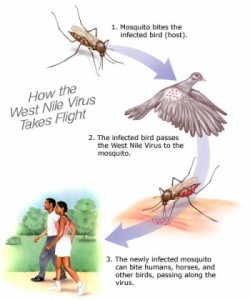By Staff
 BURLINGTON, ON Aug 2, 2011 A batch of mosquitoes collected last week in Burlington has tested positive for West Nile virus (WNV). This is the first batch of positive mosquitoes found in the City of Burlington and the second batch in Halton Region this year. The mosquitoes were collected from the area of Guelph Line and New Street. The other batch of positive mosquitoes was collected in the Town of Oakville.
BURLINGTON, ON Aug 2, 2011 A batch of mosquitoes collected last week in Burlington has tested positive for West Nile virus (WNV). This is the first batch of positive mosquitoes found in the City of Burlington and the second batch in Halton Region this year. The mosquitoes were collected from the area of Guelph Line and New Street. The other batch of positive mosquitoes was collected in the Town of Oakville.
“West Nile virus in mosquitoes has had an early start this year and we still have two months for West Nile virus to be amplified in mosquitoes in Halton,” said Dr. Monir Taha, Associate Medical Officer of Health for Halton Region. “August and September are the months of highest risk for human illness with West Nile virus, which is most serious in older adults and persons with chronic illnesses. However, it is important that all Halton residents take measures to protect themselves from mosquito bites.”
Mosquitoes can transmit WNV to humans after becoming infected by feeding on birds carrying the virus. The following are steps that residents can take to protect themselves and their families from mosquitoes:
• Cover up. Wear light-coloured, long-sleeved shirts and pants with tightly-woven fabric.
• Avoid being outdoors from early evening to morning. This is when mosquitoes are most active and likely to bite, as well as at any time in shady, wooded areas.
• Reduce mosquito breeding sites around your home by getting rid of all water-filled containers and objects. Change the water in bird baths at least once per week.
• Use an approved insect repellent, such as one containing DEET.
DEET is a registered pesticide. DEET is short for N,N-diethyl-m-toluamide (also known as N,N-diethyl-3-methylbenzamide). You probably didn’t need to know that.
[retweet]



















